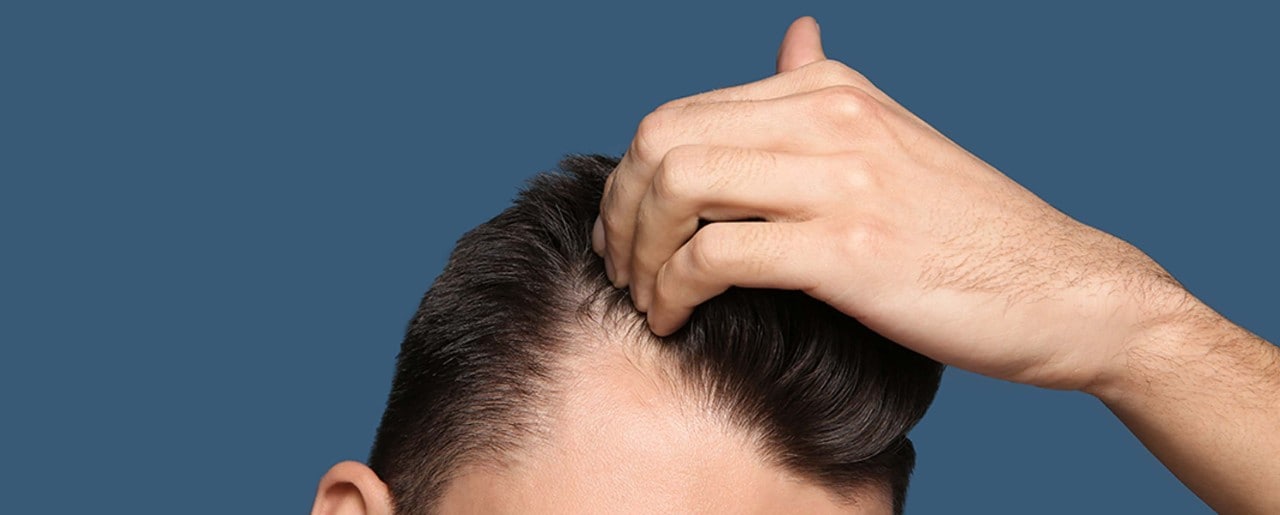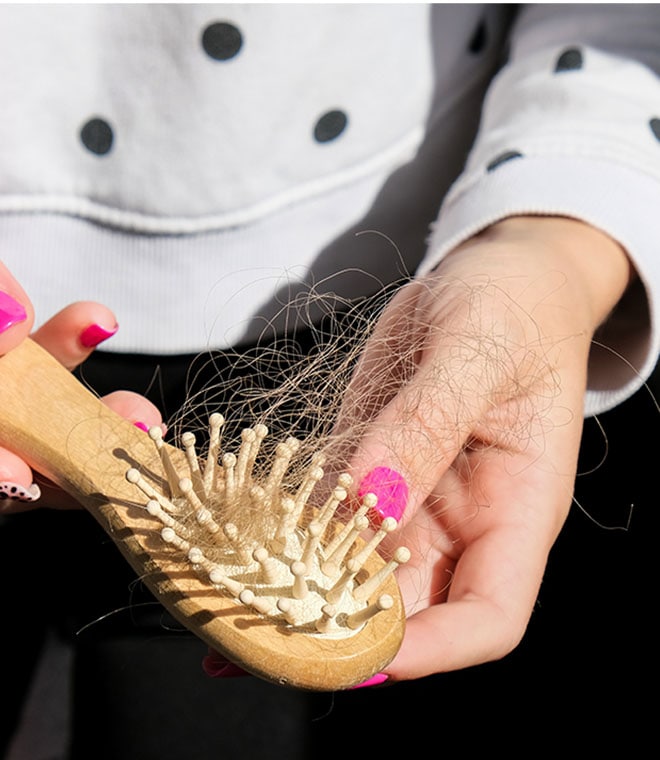Health
Hair loss FAQs: Get answers to your hair loss questions
By Anna H. Chacon, MD, FAAD Dec 05, 2022 • 10 min
Roughly 80 million Americans experience thinning hair and hair loss. Although it is a common problem, hair loss can be complex. There are several types of hair loss, each associated with different causes. It’s no wonder so many people have questions about hair loss. We’re here to clear up the confusion and answer some of the most common questions regarding hair loss.
Can a dermatologist help with hair loss?
Yes, a dermatologist or healthcare provider can help with hair loss. The medical specialty of dermatology involves caring for skin all over the body, including on the scalp. A dermatologist or healthcare provider will likely discuss your medical history and hair loss symptoms with you, conduct a physical examination and may order blood work and other tests in order to help make a diagnosis. Then they can discuss your treatment options with you, monitor your progress and modify your treatment plan as needed.
Can dandruff cause hair loss?
Although dandruff doesn’t typically cause hair loss, it can be a complication caused by hair follicle trauma from scratching the scalp. Also known as seborrheic dermatitis, dandruff occurs when your scalp sheds skin at a faster than average pace, leading to the development of flakes. Causes of dandruff include dry skin, overgrowth of a yeast called Malassezia, excessive oil production, and sensitivity to hair care products. If an inflammatory skin problem like eczema is the cause of dandruff, temporary hair loss could occur during outbreaks. However, the hair loss occurs due to the underlying condition and not the dandruff itself. Scratching or picking at scalp flakes could trigger inflammation that might also lead to temporary hair loss in the affected area.
Can anemia cause hair loss?
Iron deficiency anemia can cause hair loss. People with this type of anemia don't produce enough of a key protein called hemoglobin, which carries oxygen to cells. Inadequate hemoglobin levels may decrease blood flow to the scalp, slowing hair growth and increasing shedding.
Women, people who follow vegetarian and vegan diets, and those who exercise heavily are most likely to experience hair loss due to anemia. Normally, the hair loss is only temporary. Once a person begins treatment for anemia, hair growth typically resumes. A healthcare provider may recommend the over-the-counter topical medication minoxidil to support regrowth.
Can birth control cause hair loss?
Hormonal contraceptives like birth control pills, progestin implants, hormone injections, skin patches and vaginal rings can cause hair loss. These contraceptives work by changing hormone levels. This can impact hair growth as a result.
Some women experience a form of hair loss called telogen effluvium when they start or stop taking birth control pills. This type of hair loss typically occurs when the body experiences a shock to the system. The issue can also occur due to a sudden shift in hormone levels. In most cases, telogen effluvium is temporary and resolves on its own within a few months.
Hormonal birth control is also associated with female pattern baldness or androgenic alopecia. This type of hair loss occurs when androgen sex hormones cause hair follicles to shrink and eventually stop growing hair. Women with a personal or family history of hair loss are at an elevated risk for developing female pattern baldness from birth control. The most common treatment for this condition is minoxidil, an over-the-counter topical medication.
Can diabetes cause hair loss?
Diabetes, as well as many other health conditions, may be associated with certain types of hair loss. Your healthcare provider can help determine if a health condition may be contributing to hair loss symptoms you’re experiencing.
Can stress cause hair loss?
Both physical stress (such as a car accident or surgery) and emotional stress (caused by grief and other intense emotions) can trigger a form of hair loss called telogen effluvium. This occurs when hairs shift from the growth phase to the shedding phase at an abnormally fast pace. Shedding due to telogen effluvium usually starts suddenly and occurs all over the scalp. The condition is generally temporary. Once a person recovers from stress, hair growth typically resumes.
Can vitamin D deficiency cause hair loss?
Vitamin D deficiency may be associated with telogen effluvium and alopecia areata, two types of hair loss. Studies are ongoing to explore the role of vitamin D and hair growth.
Can wearing hats cause hair loss?
Wearing hats is not a common cause of hair loss. However, consistently wearing headwear or wearing the hair in a way that applies pressure on the scalp and pulls on the hair can lead to a form of hair loss called traction alopecia. The stress of the pulling and pressure can damage follicles, causing hair to fall out. Usually, traction alopecia is not reversible. Once hair loss occurs, it won't regrow in the affected area.
Does metformin cause hair loss?
Metformin doesn't normally cause hair loss. Alopecia or hair loss isn't listed as a side effect in the FDA’s prescribing information for metformin hydrochloride. However, other health conditions or other medications may be associated with hair loss. People experiencing hair loss while taking metformin should consult their healthcare providers.
Does radiation cause hair loss?
Yes, radiation therapy for cancer can cause hair loss in the treated area. Radiation targets and destroys fast-growing cells, and it can't differentiate between cancer and hair cells. As a result, exposure to radiation may trigger rapid scalp or body hair loss. Most people begin to see regrowth in the affected area within three to six months of finishing treatment. However, high doses of radiation can lead to permanent hair loss.
Does smoking cause hair loss?
Smoking isn’t directly known to cause hair loss. However, smoking lowers estrogen levels in women, which can cause thinning hair.
Is hair loss genetic?
Genes may play a role in androgenic alopecia, which is the most common form of hair loss in both men and women. Having a close relative with androgenic alopecia increases the risk.
Is hair shedding normal?
Yes, hair shedding is normal. After actively growing, hairs go into a dormant phase and then eventually fall out, clearing the way for new hair to grow. The average person loses between 50 and 100 hairs per day. Losing more hair than average is an indication that hair loss may be occurring.
What causes hair thinning in women?
Hair thinning in women can be caused by a number of conditions, including:
- Female pattern baldness (androgenic alopecia): Hair loss that occurs when male sex hormones called androgens reduce the size of hair follicles.
- Telogen effluvium: Hair loss that occurs when physical or mental stress causes hair to shift into the shedding phase faster than normal.
- Anagen effluvium: Hair loss that occurs because of damage to actively growing hairs. It normally occurs due to chemotherapy or radiation therapy for cancer.
- Alopecia areata: Hair loss that occurs when the immune system attacks hair follicles.
- Traction alopecia: Hair loss that occurs due to persistent pulling on hair strands. It is often due to wearing hair in tight ponytails, braids or buns.
What is alopecia?
Alopecia is the scientific term for hair loss. Often, when people say alopecia, they are referring to a specific type of hair loss called alopecia areata. This form of hair loss occurs when the immune system attacks hair follicles, leading to inflammation and rapid shedding.
What medication causes hair loss?
Many medications can cause hair loss. Some types of medications most commonly associated with hair loss include:
- Anticoagulants, such as warfarin and heparin
- Blood pressure medications, such as beta-blockers and ACE inhibitors
- Oral contraceptives
- Anticonvulsants, such as valproic acid and carbamazepine
- Mood stabilizers, such as lithium
- Chemotherapy drugs
If you're experiencing symptoms of hair loss, schedule an appointment with your healthcare provider. They can answer your specific hair loss questions, help determine the cause and develop a treatment plan that can potentially slow the rate of hair loss and support regrowth.
Published December 2022.
Sources:
- https://www.aad.org/media/stats-numbers
- https://www.aad.org/public/diseases/hair-loss/causes/18-causes
- https://www.aad.org/public/diseases/hair-loss/types/female-pattern
- https://uhs.umich.edu/dandruff
- https://www.mayoclinic.org/diseases-conditions/dandruff/symptoms-causes/syc-20353850
- https://www.aad.org/public/everyday-care/itchy-skin/itch-relief/relieve-scalp-itch
- https://health.clevelandclinic.org/im-low-in-iron-can-this-cause-me-to-lose-my-hair/
- https://medlineplus.gov/ency/article/001173.htm
- https://medlineplus.gov/genetics/condition/androgenetic-alopecia/
- https://nyulangone.org/conditions/hair-loss/types
- https://journals.lww.com/jaapa/fulltext/2018/08000/alopecia_due_to_high_androgen_index_contraceptives
- https://www.hopkinsallchildrens.org/patients-families/health-library/healthdocnew/hair-loss
- https://pubmed.ncbi.nlm.nih.gov/34553483/
- https://www.accessdata.fda.gov/drugsatfda_docs/label/2017/020357s037s039,021202s021s023lbl.pdf
- https://www.cancer.gov/about-cancer/treatment/side-effects/hair-loss
- https://smokefree.gov/quit-smoking/why-you-should-quit/health-effects
- https://my.clevelandclinic.org/health/diseases/16921-hair-loss-in-women
- https://www.mayoclinic.org/diseases-conditions/hair-loss/symptoms-causes/syc-20372926
- https://www.aad.org/public/diseases/hair-loss/treatment/diagnosis-treat
- https://www.hematology.org/education/patients/anemia/iron-deficiency
- https://www.uptodate.com/contents/telogen-effluvium
- https://www.cancer.gov/about-cancer/treatment/types/radiation-therapy/side-effects




